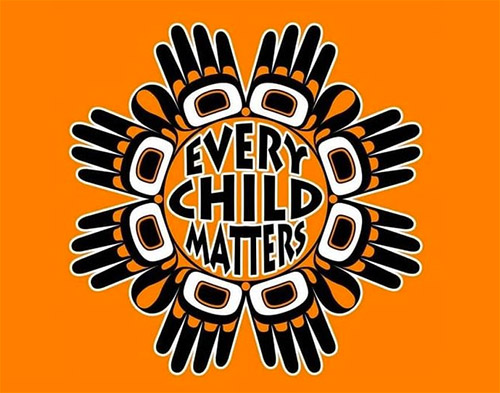
(Andy Everson of the K’ómoks First Nation, designed this logo featuring four sets of hands encircling the words ‘Every Child Matters’ against an orange backdrop)
September 30 is the National Day for Truth and Reconciliation, a day for all Canadians to recognize the ongoing trauma caused by residential schools, and honour the children who never returned home, the survivors, their families and communities.
As a community-based feminist organization, which operates within an anti-racist, anti-oppression framework, it’s an opportunity for us to commit to the process of truth, reconciliation and justice with First Nations, Inuit and Metis. At Nellie’s, we are dedicated to creating social change through education and advocacy to achieve social justice for all women and their children.
What non-Indigenous people can do to mark the day
“Education got us into this mess and education will get us out,” Justice Murray Sinclair, the head of the Truth and Reconciliation Commission, said of the residential school system in 2015.
Public commemoration and recognition of this tragic and painful history, and its intergenerational impacts, is a vital component of the reconciliation process. Here is what you can do.
- Wear orange. The National Day for Truth and Reconciliation is on Orange Shirt Day, an Indigenous-led grassroots commemorative day that promotes the concept of “Every Child Matters”. Orange Shirt Day was inspired by the story of residential school survivor Phyllis Jack Webstad, who was given a new orange shirt by her grandmother before being taken to a B.C. residential school. The shirt was confiscated and destroyed by her teacher on the first day of class. Wearing an orange shirt is a symbol of the stripping away of culture, freedom and self-esteem experienced by Indigenous children over generations.
- Educate yourself. Visit the National Centre for Truth and Reconciliation website, learn about the significance of land acknowledgements, honour treaties, read the Truth and Reconciliation Commission of Canada’s Calls to Action and the National Inquiry of Missing and Murdered Indigenous Women and Girls Calls for Justice.
- Read. Immerse yourself in Indigenous literature with this curated list from the Toronto Public Library.
- Watch. Discover the National Film Board’s rich online collection of Indigenous-made films and documentaries.
- Support. Volunteer for local Indigenous organizations or causes and support local Indigenous artists and businesses.
- Share. Help to raise awareness by sharing how you mark this day with the hashtag #NDTR on social media.



